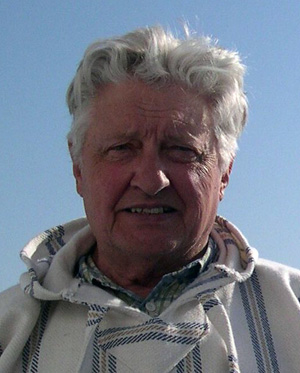
Chemical Eye on a Theoretical Truck
January 21 2012
After obtaining his Ph.D. at M.I.T., and holding a postdoctoral fellowship at the University of Cambridge, Richard eventually returned to McMaster, his alma mater, to profess chemistry for 30 years until 1996, when he officially retired. But a great scientist doesn’t just stop doing science. As an Emeritus Professor, he published 60 (out of 223 in total) refereed articles and book chapters on theoretical chemistry and physics, all of them characteristically creative – often boldly challenging conventional wisdom. His last article, published after his 80th birthday, was as inimitable as any. Of his two books, his magnum opus was “Atoms in Molecules: A Quantum Theory”, published by Oxford University Press in 1990. It is essential reading for anyone who hopes to rigorously interpret the properties of matter – whether they are measured experimentally or predicted computationally - in terms of the constituent atoms that are prescribed by the extension of quantum theory to parts of a whole. Until the pioneering work of Bader and co-workers, two generations of quantum theorists had successfully predicted the properties of individual atoms and polyatomic molecules using essentially the same mathematical machinery. Chemists assemble molecules from atoms in the lab, so it is natural for them to want to disassemble molecular properties into atomic contributions on their computer. As a graduate student at M.I.T., doing exquisitely controlled experiments on organic molecules, it seemed to the young and bold Bader that arguments over interpreting reactions of molecules were stuck in an infinite loop because “We were trying to do science with everyone using their own private dictionary.” So off he went to the original Cambridge to study theory and answer such questions as “What is a chemical bond?” He didn’t immediately find the answer, but he got started on the right track. A summary of the answers that he eventually found, as well as answers that many others were inspired by him to find on their own, can be found in the November 17, 2011, Richard F. W. Bader Festschrift issue of the Journal of Physical Chemistry A. So what’s bred in the bone of a great scientist? I believe the answer to that question lies in a story that Richard told to me when I was a graduate student of his. Like me, and many other people who grew-up to be chemists, he had set up a chemistry lab in his childhood home. But deep traits appeared years before that, when he was given his first tricycle. (Or wagon, I can’t remember, the details didn’t seem important to me at the time.) But trikes (or wagons) are just toys. Richard wanted to play with a truck. So he punctured a metal gas can with a nail, and tied it to the back of his trike (or wagon). Voilà, theoretical truck! Innate creativity, however, is a necessary but not a sufficient condition to be a great scientist. One must also be relentless in the search for scientific truth. Relentless and working hard are not the same thing. Many scientists work very hard, but are on the wrong track. To put it mildly, they didn’t like it when Richard told them so. In my mind, Richard the lionhearted scientist would no sooner abandon the foundational principles of quantum theory to find the meaning of atoms and bonds, then little Richard would have kept on trucking on an empty tank of water, even when the dinner bell was ringing. Any scolding that might have awaited him would have had absolutely no bearing. He tried his best to instill this attitude in his students at McMaster. Most students, then and now, naturally look for shortcuts and easy answers. It could take some time to get on the right track. This is how I spent most of the ‘80s. Given Richard’s famously high standards, and with the Star Wars trilogy dominating the silver screen, it was hard to avoid the Darth Bader jokes. He was good-natured about it, and responded mathematically with the inside joke “May the zero-flux be with you.” But if a comparison has to be made, he was our Master Yoda. Diamonds are a soft bosom compared to the incompressibility of the four small words “There is no try.” Richard is survived by his loving wife, three adoring daughters, and one grandson who is old enough to drive a theoretical truck. He is admired and emulated by a growing community of scientists and students that seek answers to questions of matter.
Preston MacDougall is a chemistry professor at Middle Tennessee State University. His "Chemical Eye" commentaries are featured in the News and Public Affairs portion of the Murfreesboro/Nashville NPR station WMOT (www.wmot.org).
E-mail your news &
photos to editor@sitnews.us
|
|||
